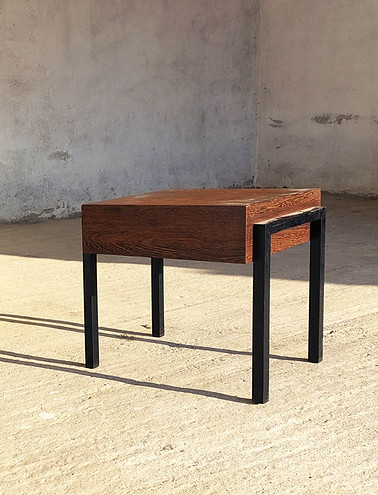
EARLY BOSSCHE SCHOOL
CHURCH SET TWO LOUNGE CHAIRS AND TWO SIDE TABLES IN SOLID WENGE WOOD
THE NETHERLANDS 1950S-1960S
Designer team / tutors
Unknown
Cabinet maker
Unknown
Movement
Bossche School
1950s-1970s
Country
The Netherlands
Materials
Solid Wenge wood and black lacquered metal legs
leatherette upholstery
Condition
Original vintage condition not restored
Price
Inquire
Item number
0001
Quantity / Number of items in the lot
Two armchairs and two side tables
Dimentions in cm :
Lounge chairs :
Height
Length
Width
Seat depth
Seat height
Side tables
Height
Length
Width
68,5
68,5
56
48
44
42,5
45
40
A church set including two lounge chairs and two side tables made of solid Wenge wood. In the style of the Bossche School movement, the Netherlands manufactured between late 1950s early 1970s
Bossche School was a post world war 2 architectural movement founded by Dom Hans van der Laan with his brother Nico van der Laan and C. Pouderoyen.
The movement was based on the reconstruction of churches that were destroyed during world war 2. They give a 3 year training to architects from 1946 to 1973 in the Kruithuis in 's-Hertogenbosch.
Minimalism, sober design, applying the plastic number rule with the use of simple available materials such as bricks, metal, concrete and any available wood.
The Bossche school used a simple rule, a proportional system based on the number π ( 1.3247...) from the mathematical cubic equation ( x³ = x + 1) A constant that is the unique real solution to the this equation. It is a geometric proportion and a fundamental constant in architecture. The rule is called the plastic number or plastic ratio. The word (Plastic) meaning formative and structural. That it is clearly showcased in this set.



Original vintage condition, not restored. They carry some marks and patina due to age and use. This set used to be in a church and were heavily used and still they are in an amazing condition considering the item history.
They are made of solid Wenge with the the plastic number architectural rule that was used during the Bossche School period to restore churches destroyed during the second world war and to make furniture.
Even though they resemble the work of Hans Dom van der Laan or his student Jan de Jong. We can not attribute them to neither, or to any other Bossche School architect, due to lack of historical documents and information about the church from where they came from. We couldn't find the blue prints or any other historical documents as reference.
